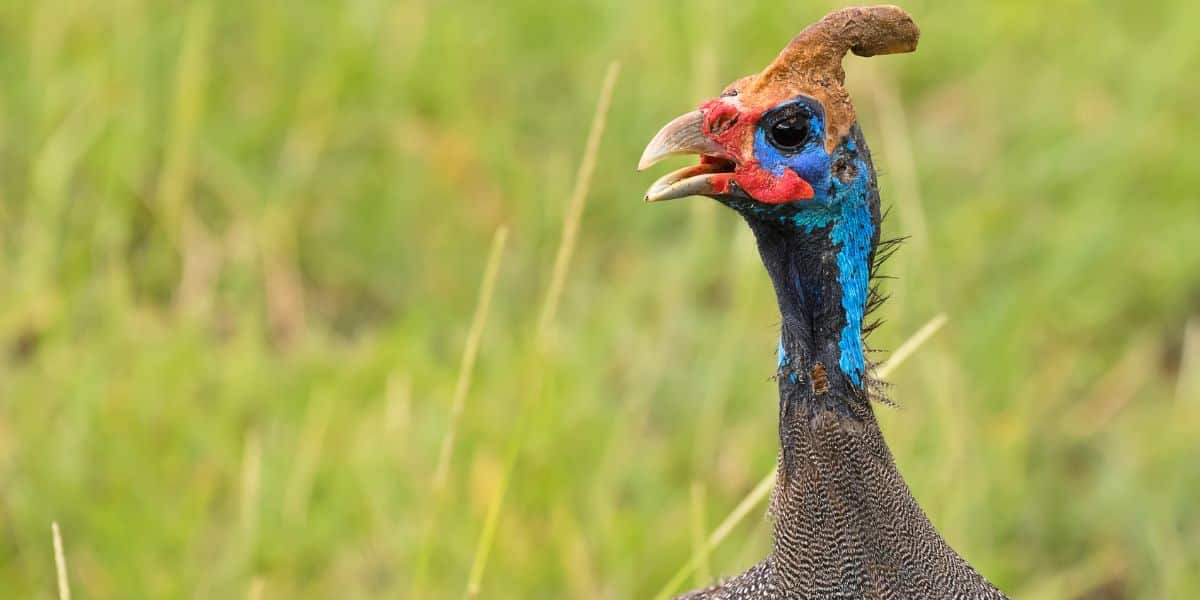Guinea fowl are fascinating creatures that communicate through a variety of signals to express their needs, emotions, and warnings. Understanding these communication signals is key to developing a deeper connection with these unique birds and ensuring their well-being.
Visual Signals
One of the primary ways guinea fowl communicate is through visual signals. Their body language can convey a wealth of information, from a raised crest indicating curiosity or alarm to rapid head-bobbing signifying excitement or readiness to mate. Paying attention to their posture, eye movements, and feather position can give valuable insights into their current state.
Vocalizations
Guinea fowl are known for their distinctive calls and vocalizations. From the loud “kek-kek-kek” alarm call that warns of potential danger to the softer, rhythmic “buckwheat” sound made during social interactions, each vocalization serves a specific purpose. By listening closely to their calls, you can decipher their messages and respond accordingly.
Feather Displays
Feathers play a significant role in guinea fowl communication. When a guinea fowl feels threatened or agitated, they may puff up their feathers to appear larger and more intimidating. On the other hand, displaying sleek, smooth feathers can indicate a state of relaxation or contentment. Observing their feather displays can provide valuable clues about their emotional state.
Understanding Social Interactions
Guinea fowl are highly social birds that rely on intricate communication signals to maintain their flock dynamics. They engage in behaviors such as grooming, preening, and mutual vocalizations to strengthen social bonds and establish hierarchies within the group. By observing their interactions closely, you can gain insights into their social structure and relationships.
Response to Environmental Cues
Guinea fowl are attuned to their environment and use communication signals to respond to various cues. For example, they may exhibit alert behavior in the presence of predators, such as freezing or emitting alarm calls. Additionally, changes in weather or food availability can trigger specific responses in guinea fowl, such as foraging behavior or seeking shelter. By understanding how they communicate in different environmental contexts, you can better meet their needs and ensure their welfare.
In conclusion, guinea fowl possess a rich and nuanced communication system that enables them to convey a wide range of messages effectively. By paying attention to their visual signals, vocalizations, feather displays, social interactions, and responses to environmental cues, you can gain a deeper understanding of these birds and enhance your relationship with them. Embrace the beauty of guinea fowl communication and connect with these remarkable creatures on a whole new level.
The Role of Vocalizations in Guinea Fowl Mating Behavior

Guinea fowl, known for their loud and distinctive vocalizations, rely heavily on their calls and sounds to communicate with other birds in their flock, especially when it comes to mating behavior. Understanding the significance of vocalizations in guinea fowl mating can provide valuable insights into their social dynamics and breeding practices.
Importance of Vocalizations
Guinea fowl use a wide range of vocalizations to convey various messages within their flock. When it comes to mating behavior, vocalizations play a crucial role in attracting mates, establishing dominance hierarchies, and signaling readiness to mate. Male guinea fowl often emit loud, repetitive calls to court females and demonstrate their fitness as potential partners. These calls not only attract females but also serve to intimidate rival males and assert dominance.
Communication Signals
The vocalizations of guinea fowl during mating season are complex and nuanced, with different calls serving different purposes. For example, male guinea fowl may produce low-pitched, resonant calls to indicate their presence and attract females. In contrast, females may respond with softer, higher-pitched calls to signal receptivity to mating. These communication signals help coordinate mating rituals and ensure successful breeding within the flock.
Behavioral Responses
In response to specific vocalizations, guinea fowl exhibit a range of behavioral responses that are essential for successful mating. Males may strut, puff up their plumage, and perform elaborate displays in conjunction with vocalizations to impress females and establish their desirability as mates. Females, on the other hand, may engage in reciprocal calling, preening, and other behaviors to signal their acceptance of a particular male’s advances.
Role in Reproductive Success
The role of vocalizations in guinea fowl mating behavior extends beyond mere communication; it directly contributes to reproductive success within the flock. By using vocalizations to attract mates, deter competitors, and coordinate mating efforts, guinea fowl increase their chances of successful breeding and offspring production. Understanding the intricacies of vocal communication in guinea fowl can lead to improved breeding practices and enhanced reproductive outcomes.
Interpreting the Meaning of Different Calls in Guinea Fowl Communication
Guinea fowl are fascinating birds known for their distinctive calls, which play a crucial role in their communication. Understanding the various sounds they make can provide valuable insights into their behavior, emotions, and needs. Let’s delve into the world of guinea fowl communication and decipher the meanings behind their different calls.
1. The Alarm Call
One of the most recognizable calls of guinea fowl is the loud and rapid alarm call. When a guinea fowl emits this sharp sound, it signals potential danger or a perceived threat in their environment. This call serves as a warning to other flock members to stay alert and ready to flee if necessary. The alarm call can vary in intensity depending on the level of perceived danger.
2. The Contact Call
Guinea fowl use contact calls to maintain communication within the flock. These calls are softer and less urgent than alarm calls, serving as a way for guinea fowl to locate each other when they are out of sight. Contact calls help the birds stay connected, especially when foraging in dense vegetation or navigating unfamiliar terrain.
3. The Mating Call
During the breeding season, male guinea fowl produce distinct calls to attract females and establish their territory. The mating call is characterized by a series of repetitive and rhythmic sounds that advertise the male’s presence and reproductive readiness. Female guinea fowl also vocalize in response to these calls, indicating their interest in mating.
4. The Food Call
Guinea fowl have specific calls associated with food-related activities. When they discover a plentiful food source or uncover insects in the soil, they emit food calls to communicate this information to the rest of the flock. These calls are often excited and enthusiastic, prompting other guinea fowl to join in the feeding frenzy.
5. The Contentment Call
In moments of relaxation and comfort, guinea fowl may emit contentment calls characterized by soft purring or gentle clucking sounds. These calls indicate a state of well-being and contentment within the flock, reflecting a sense of security and peace among the birds.
Understanding the nuances of guinea fowl communication can deepen your connection with these unique birds and enhance your ability to care for them effectively. By paying attention to the meanings behind their calls, you can respond appropriately to their needs and strengthen the bond between you and your guinea fowl flock.












